How to get rid of Chipmunks? (Humanely)
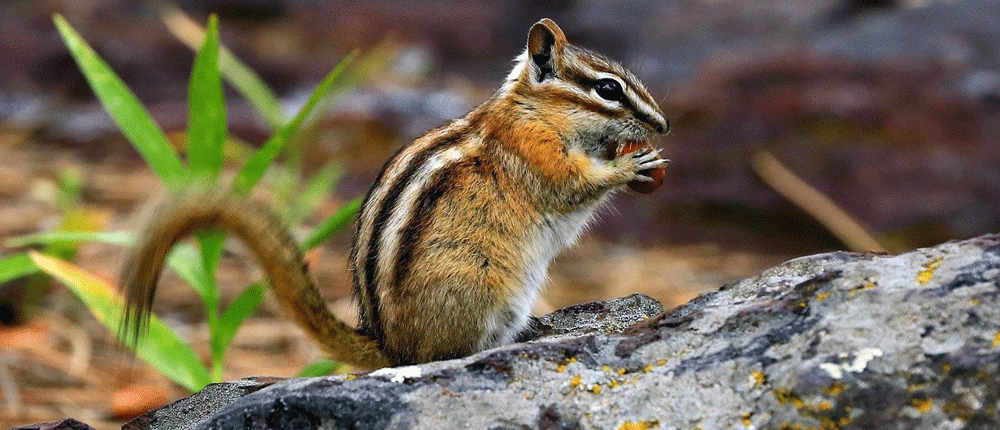 Chipmunks are one of those rodents that can enter your property and leave you disturbed and panicked. Commonly, they find their way in either through your backyard, garden, digging tunnels, or by simply entering through the door you mistakenly left open. You may find yourself in a situation where you are extremely disturbed about the chipmunk situation in your house and want to get rid of it as soon as possible. However, at the same time, you are not looking for an inhumane way to do so. You want to get rid of it in an ethical, moral, and humane way. In that case, there might be a couple of ways you can go about this. The methods and ways are listed below.
Chipmunks are one of those rodents that can enter your property and leave you disturbed and panicked. Commonly, they find their way in either through your backyard, garden, digging tunnels, or by simply entering through the door you mistakenly left open. You may find yourself in a situation where you are extremely disturbed about the chipmunk situation in your house and want to get rid of it as soon as possible. However, at the same time, you are not looking for an inhumane way to do so. You want to get rid of it in an ethical, moral, and humane way. In that case, there might be a couple of ways you can go about this. The methods and ways are listed below.
Eliminate food sources
Animals follow the trail of food. They are attracted to places where they can find as easy food source. Hence, maybe the reason chipmunks are in your house is the fact that it is housing items that are attracting them. You need to check your yard and garden for the following items and if they are present you should eliminate them immediately:
- Fruits
- Nuts
- Berries
- Bird seeds
Whether you are planting these in your garden or they fell, you should clean it up. These are food sources for chipmunks.
Note: There are certain bird seeds that chipmunks do not prefer. It is called a thistle and can be used to deter chipmunks from feeding on bird seed.
Eliminate areas of shelter
Chipmunks may also enter your house to find shelter. If you eliminate these areas, you can get rid of all the chipmunks. They will have no other option but to find another place and leave your backyard or garden. You can do this in the following ways:
- Pick up and remove any rock, stone, or debris that can be used as a hiding place.
- Build your birdhouses above ground. This can prevent chipmunks from finding shelter around it.
- You can also block their entry by using mesh or caulking.
Once you get rid of their hiding spots, they will be forced to move away.
Use a chipmunk trap
You can also get rid of chipmunks on your property by using a live trap. It is a manual way of removing chipmunks and is very simple and easy to operate. Since chipmunks are extremely small in size, the smallest size of the trap will work just fine. Make sure the trap has miniature mesh openings. This prevents any escape. Now, all you have to do is bait the chipmunk. The steps to do so are mentioned below:
- Wear protective gloves and place the trap where the chipmunk is most likely to be.
- Place a peanut inside it.
- Move away after setting the trap.
- After frequent intervals, check the trap.
- When you have caught your chipmunk, don’t leave it caged for too long. Set it free, away from your property.
Usage of repellants
Chipmunks have very strong taste buds. Any changes in the food that they intake can deter them. Repellants can be effectively used to alter the taste of leaves and plants that they consume. Both granular and liquid repellants are effective. They are both different in the kind of surfaces they can be applied to. To target certain places like birdfeeders or bulbs, it is better to use a liquid repellant. They can be sprayed easily on these surfaces. The former repellant is better in creating a boundary to create a barrier of entry such as around gardens.
Using electronic repellants
Instead of manually spraying repellants, you can instead use an electronic repellant. They differ in how they work. They are operated based on movement. If they sense any motion, they automatically get activated and activate the repellant. They can be used for a variety of purposes such as protecting vegetables, plants, trees, lawns, mesh beds, etc. The best part is that they are free of any harmful chemicals.
However, one thing is important to realize, chipmunks are very small in size. Movement and motion detection might not always work on them. In that case, chipmunks can quickly run away while the repellant may not even be activated. Thus, it is best to use this along with manual repellants. This integration allows for a higher success rate at eliminating chipmunks.
Fencing
Last but not least, you can fence the area. This might not be the most aesthetic solution, however, it is bound to bring positive results. It is also very cost-friendly, so it won’t be too big a burden on your pocket. Here are a few specifications to keep in mind when fencing.
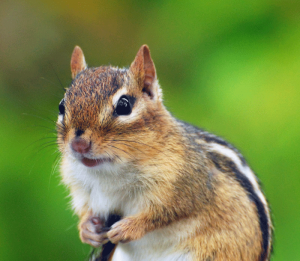
- The ideal galvanized mesh wire should be ¼”.
- It should be 1-foot-deep under the ground.
- The wire should be placed in an “L” shape. This will cover a wider area and prevent chipmunks from crawling or finding their way around.
- Find out places where chipmunks are most likely to dig holes. Once you have found these places, it is best to cover these up with soil or grass. This ensures further safety.
Some additional methods
If the above methods do not work for you or if you are looking for other ways to get rid of
chipmunks, then here is a list of other options you can go for.
- Use mothballs: They act in the same way as repellants do. They have a very bad odor that forces the chipmunks to leave. It is a preventative measure that you can use.
- Use predators: You can encourage other animals to enter your property to scare the chipmunks away. You can place an owl box to invite owls. This will scare the chipmunks away and keep them off your property.
Final Take
The above methods have a very high likelihood to help you get rid of these rodents. However, if they do not help, call for professional help. It might be time for your property to be seen by an exterminator for treatment.
How to keep chipmunks from getting into your house
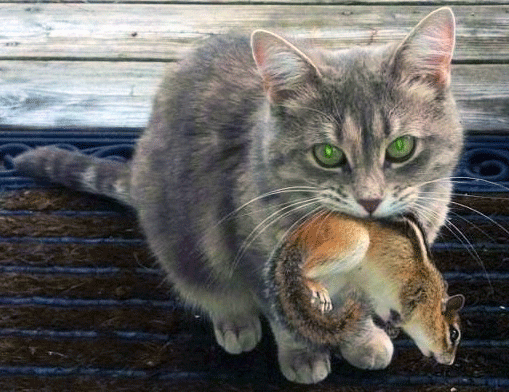 Chipmunks are rodents that are very eye-catching. They are swift, and even though they are incredibly small in size, they can cause a lot of damage. They are wild animals and if they enter your house, they can create a lot of hassle. They say prevention is better than cure. In this case, it is better to keep them away from getting into your house rather than looking for ways to make them leave once they have nestled in.
Chipmunks are rodents that are very eye-catching. They are swift, and even though they are incredibly small in size, they can cause a lot of damage. They are wild animals and if they enter your house, they can create a lot of hassle. They say prevention is better than cure. In this case, it is better to keep them away from getting into your house rather than looking for ways to make them leave once they have nestled in.
Remove any potential sources of food
Like all animals, chipmunks are attracted to food. You can control their entry by preventing any food near the house that attracts chipmunks. If you have a pet, chances are there might be crumbs of pet food in places. In that case, it can invite chipmunks. Birdseed can also invite them. It is advised to not leave any crumbs or spilled food anywhere. Not only this but if you have berries, fruits, or different kinds of nuts spilled around your yard, it is bound to be an open invitation for rodents.
Fill in any cracks in the walls
Cracks in the walls can be used by chipmunks to enter inside the house. If there are cracks, chipmunks can scratch/bite away at the remains until they can pass through. It is best to fill any of these cracks. Cement is the best substance you can use to fill these cracks and ensure that chipmunks do not enter your property. Make sure to check all the walls, especially the ones in the attic and ones leading to the basement.
Make your house unwelcoming
Chipmunks like to hide underneath things. Rocks, stones, and birdfeeders can be a hiding spot for chipmunks. It is wise to clean up any such items that may be seen as warm and friendly for the chipmunks. You can place bird feeders high above the ground where it is hard for them to reach. You can also plant garlic in your garden. This naturally prevents chipmunks from entering your house. Daffodils are another option that can be planted. They serve the same purpose.
Screen your doors
Another way to prevent chipmunks from entering your house is to make sure your doors are inaccessible. There are door extenders available that block the bottom of your door from being a source of entry. Another way to ensure that their route of entry is closed is to make sure the door fits the frame. If it does not fit, chipmunks can utilize that space and gain access. It is also a good idea to screen the doors that are frequently used. Furthermore, make sure to repair your old or damaged doors. If the screen is ripped or the door is damaged, it can easily be bitten/chewed by chipmunks to gain entry.
Chipmunks entering the house is not common. However, it is better to be careful and take all necessary precautions to ensure that they are not given entry.
HOW TO KEEP CHIPMUNKS OUT OF MY YARD
As cute as chipmunks are, they can get quite invasive. They can enter your property and create chaos. They usually enter through the yard and it can be quite difficult to remove them. However, it is not impossible. Here are some ways you can get chipmunks to leave your yard.
Use strong smells
Chipmunks have a very strong sense of smell. They use their sense of smell to detect food, threats, and even shelter. You can also use this against the chipmunks so they leave your yard. There are a few smells that chipmunks do not like. They are not a fan of strong smells and get highly uncomfortable around them. Some of these smells include:
- Garlic
- Peppermint
- Eucalyptus
- Cinnamon
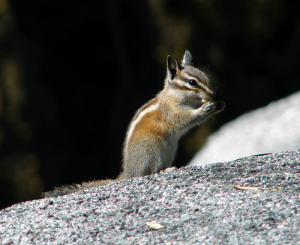 There are also many other smells that irritate chipmunks. What you can do is look for essential oils available in these scents. You can fill up a spray bottle with water and a few drops of any of the above essential oils. Then, spray this mixture onto the plants in your yard. This will serve two purposes:
There are also many other smells that irritate chipmunks. What you can do is look for essential oils available in these scents. You can fill up a spray bottle with water and a few drops of any of the above essential oils. Then, spray this mixture onto the plants in your yard. This will serve two purposes:
- First, chipmunks will stop eating the leaves because the smell will irritate them and they will try to stay away from the plant. They will think it is not fit to eat.
- Second, since the smell will be present in the whole yard, it will make them uncomfortable. They are most likely to stay away from the yard because of this. They will start looking for a new place to shelter and find food due to the strong odors.
Use a life-like predator
Like any other species in the world, chipmunks are also afraid of species larger than themselves. One such specie is the owl. By seeing, smelling, or hearing the predator, it can create a very strong sense of fear. You can use the sense of sight to scare them away. The best approach would be to purchase a life-like owl from a store. Your aim should be to place it in plain sight so that it is visible to the chipmunk. When they spot an enemy much larger than them in the same territory, they are bound to leave.
Let your pet roam around
Another way is to use the scent of your pets to scare the chipmunks away. If you have a pet, all you need to do is let it urinate around your yard. The smell can cause fear amongst the chipmunks that a predator is nearby.
Use devices that emit soundwaves
Some devices are specially created to emit certain sounds that can only be heard by animals. These soundwaves are bound to keep the chipmunks away. All you need to do is set them around your property. They will keep the chipmunks away from your yard. Not only this, but they are solar-powered. This means that these soundwave producing devices are low maintenance and can be operated without much effort.
How to Get Chipmunks Out of my Garden
Chipmunks are quite the nuisance. They love seeds, flower bulbs, vegetables, and fruits. A chipmunk is also wily and creative. For these garden pests, the best offense is to make the garden as unattractive as possible.
Six Ways to Keep Chipmunks Out of the Garden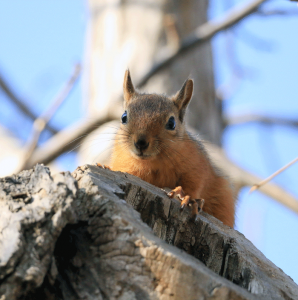
- 1. Fencing:
Install a fence around the garden and make sure it extends at least 8″ underground so they don’t burrow underneath it. Chipmunks are climbers though, so fencing isn’t always one hundred percent effective. Fencing is a deterrent though. Wire mesh around specific plants is a good plan too. - Eliminate Food Sources:
Birdseed and bird feeders are irresistible to chipmunks. Keep these far away from your garden. Choose bird feeders that are chipmunk- proof. Pick vegetables and fruits as soon as they are ripe. Rake up fallen fruit and nuts quickly since this is a prime food source for chipmunks. Do not leave pet food dishes outside. - Eliminate Nesting Options:
Chipmunks are burrowers. They prefer to locate their nests underneath or in bushes, shrubs, tall grasses, piles of logs, and rock piles. This gives them protection from predators. Clean up any areas that might appeal to chipmunks, keeping areas around the garden neat and tidy to discourage nesting. - Utilize Natural Repellents:
The most effective repellents are urine-based ones of the chipmunks’ natural predators, like coyote or fox. These are available to purchase online or at garden stores. Repellents wash away after a while so be sure to reapply often. - Encourage Natural Predators:
Owls enjoy a meal of chipmunks. Install an owl box nearby or otherwise create an environment conducive to owls to encourage them to prey. - Distraction:
If the chipmunks won’t leave, create an enticing space far from the garden with food chipmunks love. Ideally, the’ll be so enthralled by the easy food source they won’t bother to work to get to the garden.
How to keep chipmunks from eating bird seeds?
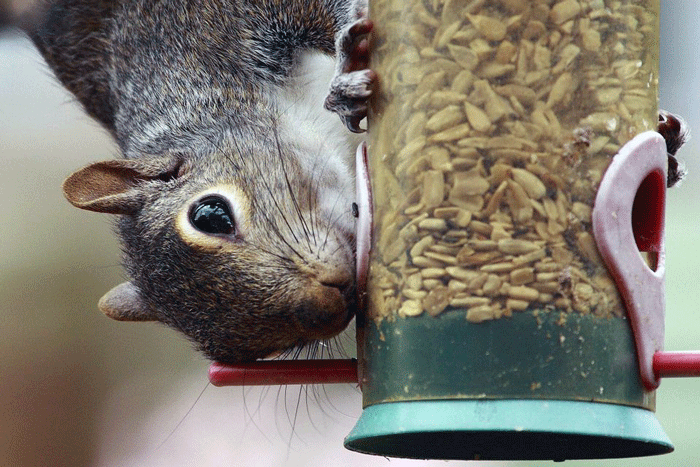 Chipmunks may look cute—but there is nothing cute about discovering that chipmunks have eaten all your birdseed or even worse, damaged the bird feeder in the process. Like squirrels, chipmunks are prone to hopping onto bird feeders and eating to their heart’s content. Unlike squirrels, chipmunks tend to stuff their cheeks as full as possible so that they can bring the hoarded food back to their burrows for safekeeping; chipmunks may also chew through wood and other materials, damaging your bird feeder permanently.
Chipmunks may look cute—but there is nothing cute about discovering that chipmunks have eaten all your birdseed or even worse, damaged the bird feeder in the process. Like squirrels, chipmunks are prone to hopping onto bird feeders and eating to their heart’s content. Unlike squirrels, chipmunks tend to stuff their cheeks as full as possible so that they can bring the hoarded food back to their burrows for safekeeping; chipmunks may also chew through wood and other materials, damaging your bird feeder permanently.
If you want to know how to keep chipmunks from eating birdseed, make sure you employ the following basic tips.
Opt for metal feeder pole mounts
Bird feeders mounted on wood and other natural materials are prime targets for chipmunks, which can climb them with ease. Rather than using a wooden mount, make sure you get a metal pole mount which will be extremely difficult—and likely impossible—for most chipmunks to climb.
Attach a net or tray underneath so food won’t fall to the ground
Chipmunks will gravitate towards bird feeders which are surrounded by bird food scattered on the ground. If you want to avoid this problem, make sure that you attach something (such as a net or a tray) underneath the bird feeder to catch everything that falls.
Install chipmunk-proof barriers below and above bird feeders
Chipmunks can’t easily get through tight spots, so you can decrease the chances that they’ll hop onto bird feeders by ensuring that there are tight barriers below and above the bird feeder itself. This will still allow birds to get access to the food without allowing chipmunks to grasp onto the sides and stuff their cheeks.
Buy birdseed that chipmunks don’t like
Another option you can take is buying birdseed that chipmunks don’t like to eat. The birdseed should include safflower and nyjer, which both taste very bitter to chipmunks. Look for birdseed mixes that specifically include these foods in order to discourage chipmunks, who may stay away from the feeder once they realize that the seeds inside taste bitter.
Discourage chipmunks from staying in your yard
Your bird feeder is more likely to be targeted by chipmunks that live inside your yard. You can decrease the chances that they’ll start eating up your bird food if you discourage them from finding your yard an appealing place to stay in the first place. Make sure you trim underneath bushes and hedges and keep a lookout for any signs of a chipmunk burrow.
Install taller bird feeders
Chipmunks prefer staying lower to the ground, so if you can’t find a metal pole that will be extremely difficult for chipmunks to climb; you can discourage them by installing taller wooden bird feeders that they are less likely to climb. Squirrels may still target these taller wooden bird feeders, so keep this in mind when choosing the material.
If you want to make sure chipmunks aren’t stealing all your birdseed, make sure to employ the above tips.
